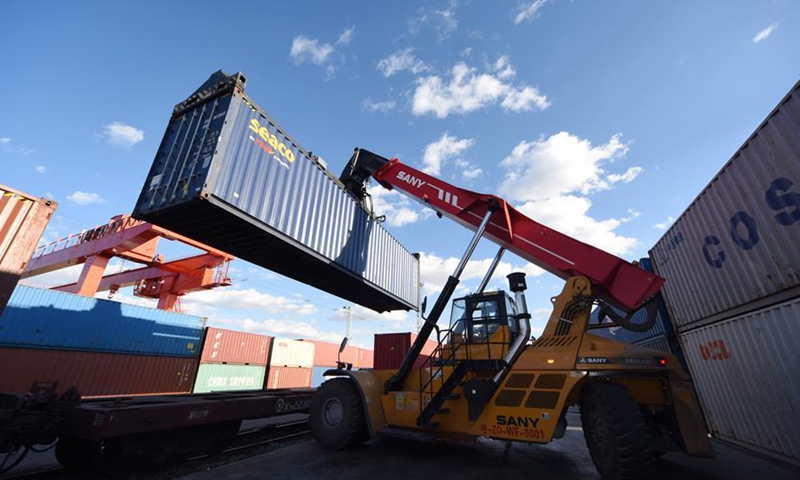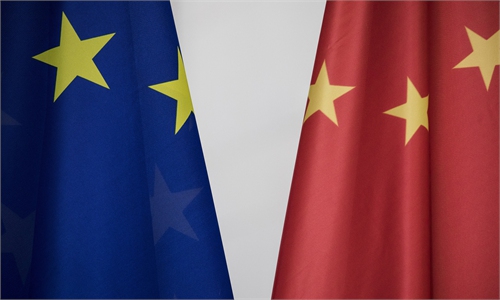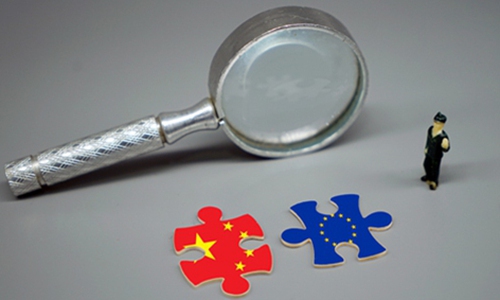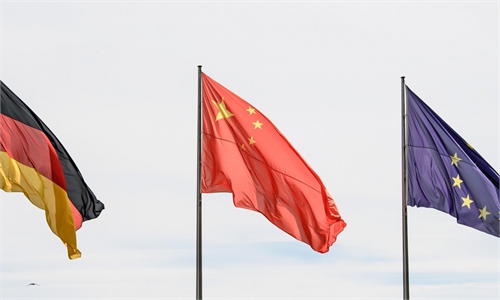EU Chamber pushes for investment deal
China, Europe expected to align more closely in economies

A crane transports containers at Erenhot Port in north China's Inner Mongolia Autonomous Region, Sept. 3, 2020. The border port of Erenhot has seen a total of 1,500 China-Europe freight trains passing through this year, local authorities said Friday. Photo:Xinhua
The top European business group in China on Thursday called on China and EU to complete a bilateral investment treaty (BIT) by the end of the year. While the China-EU relationship faces a growing list of obstacles from differences over issues such as Hong Kong and Xinjiang to external risks such as US' rising unilateralism, the two sides need bilateral cooperation more than ever to confront challenges facing the global economy, Chinese experts noted.
They said that both sides, not one, must make efforts and compromises to push forward cooperation, including talks on BIT.
In its annual position paper released on Thursday, the European Union Chamber of Commerce in China went to great lengths to highlight the difficulties facing the China-EU relationship, and it painted the bilateral investment deal as a must-do before the end of the year.
It is therefore imperative that the EU and China strive for a political agreement on the Comprehensive Agreement on Investment (CAI) by the end of 2020, said a EU chamber policy paper.
In a press release for the paper, Joerg Wuttke, president of the EU Chamber, said that "there's a real sense that this is now or never."
However, the EU Chamber's paper was noticeably largely focused on oft-repeated grievances regarding issues and difficulties in the Chinese market and even waded into the political arena, noting what it calls a "clash of China's charm offensive towards European business and its 'wolf warriors' in Europe."
Though mentioning the EU's "souring" public opinion toward China, the paper did not focus on issues in the EU itself, including tightening rules for Chinese firms' acquisitions and ambivalent stances by some EU countries on the US' crackdown on Chinese tech firm Huawei, experts noted.
"The EU has raised some issues about the Chinese market, but there are also obstacles in the EU that must be overcome," Bai Ming, deputy director of the international market research institute at the Chinese Academy of International Trade and Economic Cooperation, told the Global Times on Thursday.
Bai said that the difficult situation posed by the COVID-19 pandemic and rising global tensions requires "political wisdom" on both sides to turn this into an opportunity for cooperation rather than conflict.
Despite the COVID-19 pandemic and their differences, Chinese and EU officials have remained in close diplomatic engagement this year, with a series of high-level meetings, where both sides have largely focused on cooperation, including the bilateral investment deal.
Chinese President Xi Jinping will hold a virtual summit meeting with German Chancellor Angela Merkel, President of the European Council Charles Michel and President of the European Commission Ursula von der Leyen on Monday, the Chinese Foreign Ministry announced on Wednesday.
Among other items, the China-EU BIT and broader economic and trade cooperation will be top on the agenda for the highly anticipated summit.
Also, a high-level talk on China-EU cooperation to accelerate each other's digital economy and on China's latest proposal to discuss a set of rules to govern "global data security" will be held, sources said.
While the bilateral relationship faces many complications, and some EU countries and the EU Chamber have been more focused on the negatives, the overall relationship remains on a solid track because both sides need and support each other, Cui Hongjian, director of EU Studies at the China Institute of International Studies, said.
However, "whether it's the BIT negotiations or future China-EU economic and trade cooperation, both sides need to compromise to make it work," Cui told the Global Times on Thursday. "A mutually acceptable deal won't be reached if one side is not prepared to compromise, while expecting the other side to give ground."




